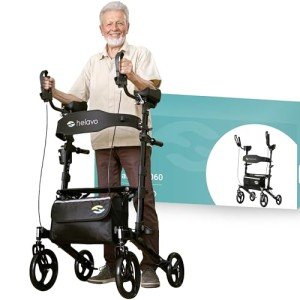What's The Job Market For Elderly Walker Professionals?
페이지 정보
작성자 Dani 작성일 25-10-04 09:37 조회 2 댓글 0본문
The Importance of Elderly Walkers: Enhancing Mobility and Independence
As individuals age, their bodies undergo numerous modifications that may impact their mobility. Conditions such as arthritis, osteoporosis, and other chronic disorders can make browsing the environment challenging for the Elderly Walker. Fortunately, assistive gadgets like walkers can substantially boost mobility, ensuring that seniors maintain their independence and quality of life. This blog post will look into the various types of walkers available, their advantages, and important considerations when picking the best one.
Understanding the Different Types of Walkers
A walker can offer the essential support for seniors dealing with mobility. However, not all walkers are produced equal. Here's a thorough breakdown of the different types of walkers offered.

| Type of Walker | Description | Best For |
|---|---|---|
| Standard Walker | A lightweight frame with four legs providing basic support. | People needing assistance while walking. |
| Two-Wheeled Walker | A walker with 2 wheels at the front permitting for much easier motion. | Users who require more mobile support for faster walking. |
| Four-Wheeled Ergonomic Walker | A rollator with four wheels, brakes, and a seat. | Active seniors who require more mobility and a place to rest. |
| Knee Walker | A specialized walker with a padded platform for resting the knee. | Individuals recuperating from foot or ankle injuries. |
| Folding Walker | A walker that can be collapsed for easy storage and transport. | Seniors requiring benefit when traveling. |
Table 1: Types of Walkers
Advantages of Using a Walker
Walkers offer a wide variety of advantages for seniors, consisting of:

- Enhanced Stability: Walkers give extra support to the user, helping to promote self-confidence while walking.
- Enhanced Balance: With a Stylish 4-Wheel Walker, seniors can redistribute their weight, improving balance and decreasing the danger of falls.
- Increased Independence: Users can move around their homes and communities more easily, permitting them to engage in social activities.
- Reduced Pain: Walkers can decrease the effect on joints and muscles, making motion less uncomfortable for conditions like arthritis.
- Flexible Usage: Walkers appropriate for different environments, whether inside your home, outdoors, or on uneven surface areas.
Table 2: Benefits of Using a Walker
Picking the Right Walker
Selecting the ideal Bariatric Walker is vital to making the most of mobility and guaranteeing comfort. Here are some factors to consider:
- Weight Capacity: Ensure that the Portable Walker can support the user's weight. A lot of walkers have a specified weight limit.
- Height Adjustment: Adjustable height features guarantee that the walker is set to the appropriate level for the user's height, promoting good posture and comfort.
- Wheels vs. No Wheels: Depending on the user's capabilities and environment, a walker with wheels may be more beneficial for movement, while a non-wheeled walker might supply more stability.
- Extra Features: Some walkers include integrated seats, storage, or devices (like cup holders) that can boost user experience.
Table 3: Considerations for Choosing a Walker
Maintenance of Walkers
Proper upkeep of walkers is essential for ensuring security and longevity. Here are some basic upkeep suggestions:
- Regular Inspections: Check for cracks, rust, or loose screws and make sure that the rubber tips on the legs are undamaged.
- Wheel Maintenance: Ensure that wheels move freely and are not stuck; lube them if essential.
- Changes: Periodically inspect if the height and settings remain right, changing them as required to keep user comfort.
Table 4: Maintenance Tips for Walkers
FAQs About Elderly Walkers
1. What is the average cost of an elderly walker?
The prices of walkers can range substantially based upon the type and features. Standard walkers might cost between ₤ 50-₤ 100, while specialty walkers or rollators can range from ₤ 100 to ₤ 300.
2. Are walkers covered by insurance?
Numerous insurance strategies, consisting of Medicare, cover the cost of walkers, provided they are deemed medically required. It's important to consult your insurance company for specifics.
3. How do I know when my liked one requires a walker?
Signs may include trouble walking independently, regular falls or near-falls, and increased tiredness while carrying out daily activities. A healthcare specialist can provide a comprehensive assessment.
4. Can walkers be utilized outside?
Yes, lots of walkers can be utilized both inside and outdoors. If preparing to use a walker outdoors, consider a design with wheels or broader legs for stability on different terrains.
5. For how long can a walker last?
With proper upkeep, a great quality walker can last for several years, though wear and tear will differ depending on use frequency and conditions.
Walkers are important tools that can restore mobility and independence for seniors while ensuring their safety. As people live longer and lead active lifestyles, purchasing appropriate assistive gadgets like walkers is more vital than ever. Understanding the kinds of walkers readily available, their benefits, and how to select the right one can empower users and their caretakers to make informed options. Eventually, the best walker can result in enhanced quality of life, permitting aging people to remain active individuals in their communities.
- 이전글 Everything you'll Want to Find out about Hypoglycemia (Low Blood Sugar)
- 다음글 9 . What Your Parents Teach You About Door Installation Near Me
댓글목록 0
등록된 댓글이 없습니다.
